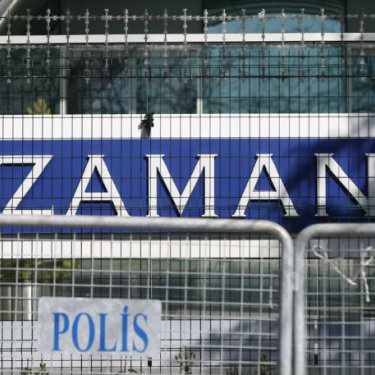Turkey: life imprisonment sought for nine Zaman newspaper columnists

Reporters Without Borders (RSF) regards the long prison sentences sought by the prosecution in the trial of 31 former Zaman newspaper employees – including life imprisonment for nine of its former columnists – as an extremely ruthless act of political revenge.
The sentences were requested at the third hearing held on 5 April inside Silivri high security prison, 85 km west of Istanbul, at which the prosecution began to rush the trial. RSF’s Turkey representative attended the hearing as an observer.
If the court passes the requested sentences, the nine columnists – Şahin Alpay, Ahmet Turan Alkan, Ali Bulaç, Mümtazer Türköne, İbrahim Karayel, Mehmet Özdemir, Mustafa Ünal, İhsan Duran Dağı and Orhan Kemal Cengiz – will spend the rest of their lives in the strictest isolation, with no possibility of parole, and with minimal family visits. It is the Turkish penal system’s harshest punishment.
Their crime was writing columns for Zaman, Turkey’s most widely read newspaper until it was placed under state control and then closed by decree in 2016. The newspaper’s editorial position was favourable to the Gülen movement, a onetime government ally now accused of being behind an abortive coup attempt in July 2016.
This nonetheless sufficed for the prosecution to claim that these nine journalists “tried to overthrow constitutional order” and “belonged to a terrorist organization.” No evidence of individual involvement in acts of violence or condoning violence was produced. The prosecution claimed that the sole aim of their editorials critical of the government was to create a public “perception” favourable to a coup.
The prosecutor also asked the court to convict 20 Zaman administrators, technical employees and investors of “belonging to a terrorist organization” and two of its journalists, Nuriye Ural and Lalezar Sarı İbrahimoğlu, of “assisting a terrorist organization.” Both charges carry long jail sentences.
“The unimaginable is becoming the norm in Turkey,” RSF Turkey representative Erol Önderoğlu said. “Is life imprisonment going to become the standard price for practicing the ‘crime’ of journalism? The sole aim of this flawed and rushed trial is to execute a political reprisal dictated by the government.”
Önderoğlu added: “We again demand the immediate release of these journalists and the withdrawal of the proceedings in the absence of any evidence of individual involvement in a crime recognized by international law.”
Seventeen of the defendants, including Ahmet Turan Alkan, Ali Bulaç and Mümtazer Türköne, have already spent more than a year and a half in provisional detention. The well-known columnist Şahin Alpay was released from prison and placed under house arrest in March after being held for 18 months. This did not however satisfy either the European Court of Human Rights or Turkey’s constitutional court, both of which have issued rulings calling for all restrictions on his freedom to be lifted.
The defence lawyers were unanimous in claiming that the trial is being conducted in a summary fashion. No one had expected that the prosecutor would begin presenting his summing-up at this hearing when the earlier stages of the trial have not yet been completed.
At this hearing, the lawyers representing the journalists discovered the existence of prosecution evidence of which they had not previously been notified. The court rejected their request for experts to examine certain prosecution evidence, although the summing-up included arbitrary and one-sided interpretation of many columns.
To speed up the proceedings even more, the court agreed to split the trial four ways, with the columnists, administrators, technical employees and investors henceforth being tried separately. The next hearing for the columnists has been scheduled for 10 and 11 May and is supposed to end with a verdict.
Representatives of the Swedish consulate, the European Union’s Ankara delegation and the NGOs Article 19 and P24 also observed the 5 April hearing.
Turkey is ranked 155th out of 180 countries in RSF’s 2017 World Press Freedom Index. The already worrying media situation has become critical under the state of emergency proclaimed after the July 2016 coup attempt. Around 150 media outlets have been closed, mass trials are being held and the country now holds the world record for the number of professional journalists detained.



